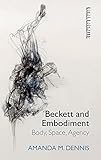Beckett and Embodiment : Body, Space, Agency / Amanda M. Dennis.
Material type: TextSeries: Other Becketts : OTBEPublisher: Edinburgh : Edinburgh University Press, [2022]Copyright date: ©2021Description: 1 online resource (256 p.)Content type:
TextSeries: Other Becketts : OTBEPublisher: Edinburgh : Edinburgh University Press, [2022]Copyright date: ©2021Description: 1 online resource (256 p.)Content type: - 9781474462990
- 9781474463010
- 848.91409 23
- PR6003.E282
- online - DeGruyter
| Item type | Current library | Call number | URL | Status | Notes | Barcode | |
|---|---|---|---|---|---|---|---|
 eBook
eBook
|
Biblioteca "Angelicum" Pont. Univ. S.Tommaso d'Aquino Nuvola online | online - DeGruyter (Browse shelf(Opens below)) | Online access | Not for loan (Accesso limitato) | Accesso per gli utenti autorizzati / Access for authorized users | (dgr)9781474463010 |
Frontmatter -- Contents -- Series Editor’s Preface -- Acknowledgements -- Illustrations -- Abbreviations -- Introduction Embodied Agency: Towards an Ecology of the Subject -- 1. From Cartesian Ruins: Rocking Chair Phenomenology -- 2. Short-Circuited Rationalism, or How the Body Means -- 3. From Dialectics to Infinity: Life Cycles in Molloy, Malone Dies and Endgame -- 4. Radical Indecision: Aporia and Embodied Agency in The Unnamable -- 5. Style and the Violence of Passivity: How It Is -- 6. Compulsive Bodies, Creative Bodies: Quad and Agency -- 7. The Body and Creation: Worstward Ho -- Conclusion: Embedded in the World: Beckett, Late Modernism, Earth-Body Art -- Bibliography -- Index
restricted access online access with authorization star
http://purl.org/coar/access_right/c_16ec
Reveals how the body in Beckett, embedded in its material environment, exhibits embodied agencyAccents the importance of the body in Beckett and provides a new reading of the body in his postwar writing and experimental prose of the 60’s and 80’sThe first study of Beckett and Merleau-Ponty as thinkers of space, this book asks how the body’s relation to its surroundings both limits and enables agencyShows how Beckett and Merleau-Ponty inform contemporary debates about post-humanism, ecology and the body’s relation to its material environmentExamines Beckett’s ambivalent critique of humanist agency (as will) and draws on phenomenology to reveal in Beckett a version of agency that is more robust than poststructuralist or deconstructionist modelsThis book argues that the abject, decrepit body in Beckett does not signal the impossibility of agency but demands its reconceptualisation. Analysing the representation of the body in relation to the environment in Beckett’s work, the author interrogates the power to do and act. Separating dynamic interaction from willed intention, Amanda Dennis shows how Beckett’s oeuvre refashions subjectivity in dialogue with a disintegrating environment. The book provides a phenomenological reading of Beckett to argue that sensation and embodiment support our interactions with our material world, enabling possibilities for embodied agency in collaboration with our physical and linguistic surroundings.
Mode of access: Internet via World Wide Web.
In English.
Description based on online resource; title from PDF title page (publisher's Web site, viewed 25. Jun 2024)


